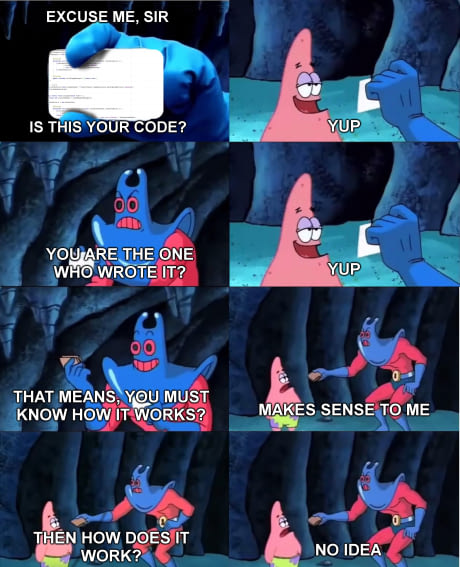Ranter
Join devRant
Do all the things like
++ or -- rants, post your own rants, comment on others' rants and build your customized dev avatar
Sign Up
Pipeless API

From the creators of devRant, Pipeless lets you power real-time personalized recommendations and activity feeds using a simple API
Learn More
Comments
-
 daveit438yDepends on the kind of debugger. gdb/pdb don't give you any information unless you ask for it.
daveit438yDepends on the kind of debugger. gdb/pdb don't give you any information unless you ask for it.
Print debugging works well only if your program runs quickly. If you have to wait 5 minutes after inserting another print call, a debugger is a better solution.
For learning I think a debugger isn't really necessary. So while reading the book I'd stick to his way. Later you can then see where a debugger makes more sense. -
The point they make there is that most of the time, python's excellent stack tracing should give you enough of an idea where shit hit the fan.
And so far I can say that most of the time that holds true. -
 JohanO20308y@evilmupp3t If it crashes, yes. But to trace down logical bugs a debugger is extremely useful. I wouldnt go near a language/tool that hasn't a decent debugger with singlestep and breakpoints.
JohanO20308y@evilmupp3t If it crashes, yes. But to trace down logical bugs a debugger is extremely useful. I wouldnt go near a language/tool that hasn't a decent debugger with singlestep and breakpoints. -
spacem18278yMaybe this person doesn't know how to use their debugger properly.. still I have seen people rely too much on the debugger when they could just read the code to find what they need.
-
@spacem If you talked about me True I don't know much about debuggers I debug with print lines but the author Zed Shaw (you may know him from "Programming, Motherfucker" initiative) definitely must know about debuggers.
-
 GTom7067yThis comes from nature of Python. I never had to use any debugger, you just put logging/print() here and there to debug anything.
GTom7067yThis comes from nature of Python. I never had to use any debugger, you just put logging/print() here and there to debug anything.
Related Rants
-
 Dacexi24
Dacexi24 When there are only 2 pages on Google you know you're in serious shit.
When there are only 2 pages on Google you know you're in serious shit. -
 practiseSafeHex20Fixing a parents iPhone, episode 1. Problem: "Whatsapp is gone off my phone" Debugging: Me: *unlocks phone...
practiseSafeHex20Fixing a parents iPhone, episode 1. Problem: "Whatsapp is gone off my phone" Debugging: Me: *unlocks phone... -
 nachocode6
nachocode6 When you talk to other devs about what their code did. I also relate myself to this.
When you talk to other devs about what their code did. I also relate myself to this.

Do not use a "debugger".
A debugger is like doing a full-body scan of a sick person. You do not get any specific useful information, and you find a whole lot of information that doesn't help and is just confusing.
Source: Learn Python The Hard Way
Your thought on it?
rant
debugging
debugger